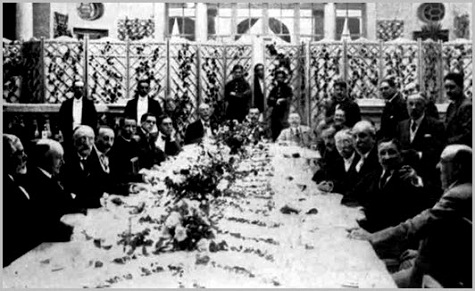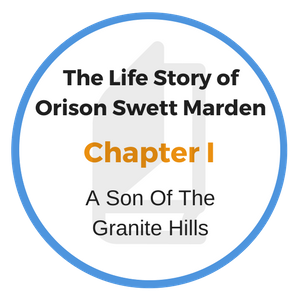- Home
- Self Growth Library
- Orison Swett Marden Chapter XXIII
Orison Swett Marden Chapter XXIII
The Message Of His Writing
The Life Story of Orison Swett Marden Chapter XXIII:
When Ward, the famous American sculptor, was asked to make a speech at the unveiling of his statue of George Peabody in London, he pointed to the statue, and said, "That is my speech."
In terms as brief, it might be said, "Orison Swett Marden's books are his best biography."
Marden's philosophy, his ideals, his enthusiasms, his interpretation of life, his religion, his conception of real success, and the methods by which all men and women may achieve it, are all set forth in his writings.
All of the experiences — the failures and the triumphs, the joys and the sorrows, the sadness and the gladness, — of his seventy-four years were, in a familiar phrase of his own, "ground into paint" for the life pictures he has unconsciously portrayed in his books. They reveal his character and his beliefs.In all his writings there is an intimate human quality which establishes a magnetic correspondence between writer and reader, a communion of spirit that brings them into closer relationship than could direct personal contact. No happier description of this relationship could be given than that conveyed in the expression of one who knew him, "He was an interpreter of men's souls to themselves."
The keynote of his philosophy of life and of his writings is that man is one with his God in the same sense in which Christ said, "I and My Father are one;" that God meant man to be a success, not a failure; that he should rise, step by step, through his own efforts, to godlike heights; and that, to fulfill this plan, he unfolded in every human being the power to match his highest ambition. In one of his most popular books, "The Miracle of Right Thought," he says:
"The bird does not have an instinct to fly South in winter without a real South to match it; nor has the Creator given to us these heart yearnings, these soul longings for a larger, more complete life, for an opportunity for a full expression of our possibilities, nor the longing for immortality, without a reality to match them... No one is mocked with yearning for that which he has no ability to attain. If he holds the right mental attitude, and struggles earnestly and honestly toward his goal, he can reach it."
Humanity needs constant cheering and stimulus; and, with his ringing words of cheer and encouragement, Doctor Marden brought a new light, a message of hope and joy to the ambitious, the poor, the struggling, the handicapped, the discouraged, and the defeated, throughout the world.
He showed them that they were not puppets of a blind fate, dependent on this or that person or condition for the attainment of their ambition, but that there is a divine power within every being that will bring the health, the success, the peace and happiness for which we all long.
Some sneer at the success doctrine as materialistic, quote the Bible, and say, "You cannot serve two masters; you cannot worship God and Mammon." Mammon referred to wealth and riches, which some considered as an evil and corrupt influence.
The kind of success advocated in Dr. Marden's writings had nothing to do with Mammon. It was based on self development, on character, on the practice of the Golden Rule, on service to one's fellow men. But it did mean, incidentally, triumph over poverty, — for Marden knew what poverty was. He had struggled with it and he had conquered it. He knew what it can do to weaker souls, — how it can degrade and brutalize, — and he wanted to help banish it from the earth.
To this end he constantly used his voice and pen, for he believed grinding, hopeless poverty to be one of the greatest of modern curses. He regarded it as a preventable disease, which causes more havoc in human life than any disease of the flesh. Feeling it to be a sacred duty to do his part in stamping it out, in the most effective way, — explaining the mental laws by the intelligent use of which a sufferer may himself overcome this universal disease, — he wrote hardly one book of his fifty that does not contain a chapter on some phase of poverty and its cure.
One book is devoted chiefly to the subject of poverty. How strongly he felt in regard to it is shown in the following extracts from "The Victorious Attitude":
"The Bible tells us 'The destruction of the poor is their poverty'."
"Extreme poverty is a scourge that draws its victims down from depths to lower depths — that makes life a bitter struggle for the bare crumbs that hold body and soul together...
"Every year poverty claims its tens of thousands of innocent victims among the little children who die of disease and neglect in damp, foul cellars, where the sun never enters. It sweeps them into mills and factories where, robbed of the rights of childhood, they become warped and twisted men and women, full of bitterness, discontent, unrest, and unsatisfied ambitions and longings."
"Poverty drives multitudes to crime, to insanity, to death. It is responsible for more ignorance and crime, more discontent and unhappiness, more suicides and ruined ambitions, more wrecked hopes and homes, than anything else...
"If we are to progress as a race, as a civilization, we must drive this crushing poverty disease from our midst. Instead of lauding its blessings, as some do, it is our duty to get away from it and to help others to do so.
"The poverty disease, the poverty curse, is not a decree of Providence. It is largely the result of ignorance. Every human being on this earth could be living in comfort if he knew the powers locked up in himself and were willing to work and make the best use of them. If the poverty antidotes were as generally known as are the poison antidotes there would be no poor people."
While not minimizing the evils of economic systems that continually increase the army of the poor, he had the most profound faith in the ability of the individual to lift himself out of the degradation and humiliation of the extreme poverty that gives us a "submerged tenth", referencing the ten percent of any population that typically remains in poverty.
The testimony of those who have practiced Marden's teachings amply justifies his faith.
The evils of great wealth he condemns as strenuously as those of want. The luxury and self-indulgence made possible by the possession of unlimited wealth are, he says, often greater hindrances to the highest development of men than the limitations of destitution.
He believed that anything which makes void the divine decree — "In the sweat of thy face shalt thou eat bread," — is harmful to the individual; that in removing the necessity for work, the greatest incentive to self-development is taken away and replaced by the means to indulge the lower passions. "Work," he says, "is the price of strength, health, manliness, masterfulness, complete self-unfoldment. It is Nature's instrument for man's physical, mental, and spiritual development."
Charles Wagner himself was as much an advocate of the simple life than was Orison Swett Marden. His own rule of life was simple to the point of frugality, and in his books, his editorials and articles, he constantly stressed the beauty of simplicity, — the health and happiness and contentment that comes from it.
His interpretation of life, his practical work-a-day philosophy and his credo of happiness for all are, perhaps, nowhere more fully and clearly expressed than in the two little volumes: "The Joys of Living" and "Love's Way." The former, especially, opens to the reader a new view of life, — its undiscovered possibilities of happiness even in the humblest environment.
"The whole world," cries the author, "is full of unworked joy mines. Everywhere we go we may find all sorts of happiness-producing material, if we only know how to extract it.
"We are all anxiious to attain to our loftiest estate, but how many of us are willing to pay the price of attainment!"
- O.S. Marden
"If we are ever happy, it will be because we create happiness out of our environment, with all its vexations, cares, and disheartening conditions. He who does not learn to create his happiness, as he goes along, out of the day's work with all its trials, its antagonisms, its obstacles, with all its little annoyances and disappointments, has missed the great secret of life. It is out of this daily round of duties — out of the stress and strain and strife of life, the attrition of mind with mind, disposition with disposition, — out of this huckstering, buying and selling world, — that we must get the honey of life, just as the bee sucks the sweetness from all sorts of flowers and weeds...
"The trouble with us is that we expect too much from the great happenings, the unusual things, and we overlook the common flowers on the path of life, from which we might extract sweets, comforts and a multitude of delights."
The whole purpose of these books is to show how life, the simplest and most laborious, may be made a glory instead of a grind, — to "Teach us delight in simple things And mirth that has no bitter springs; Forgiveness free of evil done, And Love to all men 'neath the sun."
He maintains, with the philosophers of all ages, that happiness is a condition of mind, not of environment, and within the reach of every normal human being. A roof to cover him, simple clothing, plain, wholesome food, with the Creator's free gifts, — sunlight, air, water, the beauties of earth and sky, — according to his creed, fulfill the requirements for the happiness of men and women.
"A man cannot directly choose his circumstances, but he can choose his thoughts, and so indirectly, yet surely, shape his future."
- James Lane Allen
Orison Swett Marden Chapter XXIII , continued...
His was no destructive philosophy. Everything he wrote was constructive. In all of his writings, spread over a period of half a century, there is not a line of pessimism or gloom. Marden was no careless, unthinking optimist, closing his eyes to the evils and injustice so widespread in the world, but devoted his mind and his energies wholly to uplifting, not to tearing down.
He called attention to evils, — only to show how they may be remedied, — how society, as well as the individual, may triumph over everything tending to hinder progress.
He was a profound believer in the ultimate triumph of Truth and Justice and in the high destiny of the human race, — its rise to godlike power and achievements. He invariably stressed man's greatness. Because of his oneness with Infinite Power, he believed his possibilities to be practically limitless, and that, while working in partnership with the Creator, there was nothing too great for him to dream or to dare.
Most of the older writers, philosophers, and theologians emphasized the littleness, the weakness and helplessness of man, the sadness, the evils and the miseries of human life; but this modern philosopher showed the opposite side of the picture. His picture is not without shades, but the lights predominate. He has shown every side of human nature in his books, but always he has looked for and found the best in man, — his divinity. He has found that the good (God) in the lowest human being outweighs the bad. This is the real secret of his wide appeal, — he has written for Humanity.
This thought is beautifully expressed in the following poem, "Go Little Book," by Edwin Markham, author of "The Man With the Hoe." The poem was written and inscribed by his poet friend to Doctor Marden on the publication of his book, "The Miracle of Right Thought":
Go, little book, to all the Earth,
Go to the chambers loud with mirth,
To teach the careless, mocking heart,
Love's deeper chord, Life's nobler part.
Go to the chambers of the sad,
To teach the gospel of the glad;
Go out on all their darker roads,
With joy to lift their daily loads.
Go to the rich in lordly towers,
To tell the import of the hours;
Go, lighting up their eyes to see
Their unsuspected poverty.
Go to the poor, down lowly ways,
To speak the wonder of the days;
Go, tell them of their strength of old
And all their unsuspected gold.
As the founder or father of a great new school of inspirational philosophy, Doctor Marden became a universal "father confessor." To him, all along through the years after the publication of his first book, "Pushing to the Front," tens of thousands turned for advice in solving their life problems.
Men and women of all ranks and countries laid bare to him the secrets of their lives, wrote of their loves and fears, their ideals and ambitions, their mistakes and shortcomings, their false steps, their crimes, their failures and successes, their hopes and dreams, — the most intimate personal relations of their lives.
Such letters were to him sacred confidences that, under no circumstances could be violated. But, insofar as humanly possible, each one met with a sympathetic response.
Through his correspondence he was in close touch with the very heart of humanity. He kept his finger on its pulse and learned more of its difficulties and perplexities, its cares and anxieties, its strength and weakness, than it would be possible to learn in any other way.
It so deepened his knowledge of character and of the personal side of every human problem, of every disease of the mind — fear, worry, hate, envy, jealousy, timidity, cowardice, and all other destructive mental states, — that, like a skillful physician treating the body, he could diagnose every case that came under his attention and prescribe a remedy for the patient.
Though the form of treatment prescribed might differ according to the nature of the disease, or of the problem to be solved, the principle underlying the prescription was always the same. To everyone he said, in effect, — "Through the power of the God within you, you can heal yourself. You can be well and happy. You can transform your personality, your life. You can be what you long to be."
The world-wide response to the message of his writing was the supreme reward of his efforts. It is easy to imagine the inspiration that came back to him in grateful letters from all sorts and conditions of people who had been inspired through the reading of his magazine or some of his books. The following are extracts from a few of them:
"After being in a life of Hell, misery, discouragement, and failure, I was saved and brought back to life by reading your book. It not only saved me from self-destruction, but made me over new, — born again, and into a life of happiness, peace, and joy."
Another says: "Please allow me to introduce myself as just a common everyday working man, striving to obtain the most that I can out of this life, which was, indeed, in appearance, very little until by chance I happened to read one of your books. It was eagerly consumed and digested by my hungry heart - that yearned for more of this inspiring food.
Allow me to congratulate you on the work of the highest kind that you are doing; it brings cheer and opens a new chapter in many a young man's life that is never heard from by you; in my own case, a new vision of life was revealed to me, a desire to do the little good I was able, if only to wear a smile. I had to write and thank you for your great and universal work."
An old man writes, "The pleasure your writing gives me is indescribable. It is a builder of youth and a solace of old age."
"I want to tell you, in a heartful way," says a woman, "that thousands of your readers love you because you are helping them to attain."
Another woman's letter reveals the averting of a tragedy: "A very dear friend of mine, crushed by repeated failures, was planning suicide. She had her preparations complete. It came to me one day like an inspiration to send her your book. I acted on it at once. Months afterward she told me how it had saved her."
"If there is any one royal secret of self-improvement, it lies in the right use of one's daily opportunities."
"Your work is the whole Grand Sermon," writes a young Japanese student. "I have never heard nor read a gospel so forcibly expounded. It appeals to the soul of man. Indeed, every word weighs by the pound of gold. No wonder, having such an author like Doctor Marden as an exponent of spiritual life as well as the leader of mental and physical life, America today stands foremost among the nations of the world!
Since I read your book I feel like a new man. May Doctor Marden's service to his country and to the people of other nations be crowned with success, glory and honor. I confess that I am very much indebted to him for an encouragement I am feeling daily since I started reading his books."
Hon. Ben. B. Lindsey, Judge of the Juvenile Court, Denver, Colorado, says, "I owe you a debt I can never repay, for all unconsciously you have been in a large measure responsible for the success of our little work out here. I have been inspired, cheered, encouraged, helped, and up-lifted, as, I am sure, thousands of others have been by your gospel and your message. What a joy it must be to know how you have helped, cheered, and encouraged others! I always keep your books on my desk in the court room."
Significant of the esteem in which his philosophy is held in Spain, is the following letter from the sovereign, King Alfonso, to Doctor Marden's Spanish publisher:
(Seal) Private Secretary
Palace of Sal Idlefonso to His Majesty, the King
Illustrious sir, and with my most distinguished compliments: His Majesty, the King, our Master, has graciously ordered me to thank you, in his royal name, for the copy of the interesting work by Doctor Orison Swett Marden, entitled "Pushing to the Front," which you have offered for his courteous consideration.
His Majesty has accepted this work with especial satisfaction: accordingly, I am acquainting you with the enthusiasm which our Sovereign feels, inasmuch as the book will help to invigorate the race and to strengthen the national character.
(Signed) F. D. DE TORRES.
Later, by order of the Minister of Education in the Spanish Cabinet, Doctor Marden's books, thirty of which are published in Spanish, were put on the reading list of all the educational institutions above the primary schools throughout the country.
At an educational convention in Madrid, where the greatest educators of the world were assembled, a complimentary banquet was given in honor of the American author and the tremendous influence of his writings upon the Spanish people. There was no one present at this convention whom he had ever met, and Doctor Marden knew nothing whatsoever about it until he received a photograph of the convention dinner.
 Dinner Given In Honor Of Dr. Marden In Madrid, Spain
Dinner Given In Honor Of Dr. Marden In Madrid, SpainThe Marden philosophy has made as deep an impression in the Spanish-speaking South American republics as it has in the mother country. The President of Guatemala ordered a special edition of nine thousand copies of one Marden book, to be used as prizes in the public schools of the Republic. The Peruvian and Nicaraguan Congresses passed a vote highly commending Doctor Marden's works as civilization builders, and urging their introduction in all the colleges and universities of their states.
The prime minister of another of the republics ordered the duty removed from one of the Marden books on the ground that no obstruction should be put in the way of a work of such great value to the youth of the country.
German scientists accepted Doctor Marden as one of the greatest metaphysicians of his generation. Thirty of his books have been translated into the German language, and more than five hundred thousand copies have been sold in Germany. All told, nearly three million of the Marden books have been translated into more than twenty-five languages.
It was the humanness of the message their author gave to the world, its recognition of the divinity and the fundamental oneness of mankind, regardless of differences of race, creed, or color, that won it enthusiastic acceptance not only in Catholic Spain and Protestant Germany, but also in other leading countries of Europe, as well as in the Orient.
Doctor Marden's fertility of authorship was hardly less remarkable than the quality of his message. No matter how busy the day, he could always find a few moments here and there to dictate some of the many thoughts which thronged his brain. A dictating machine stood constantly at the side of his desk so that not a minute should be wasted. In addition to his work upon Success and his many other affairs — both in a business way and at home — he managed to average two books a year, and just before his death he told the writer that he had about two million words of manuscript awaiting publication.






